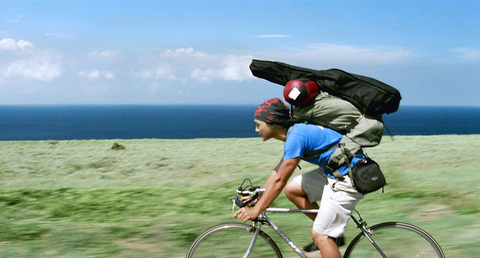A child of Taiwan's New Wave cinema, award-winning cinematographer En Chen (陳懷恩) has been a long-term collaborator of Hou Hsiao-hsien (侯孝賢) and has worked with acclaimed directors such as Chang Tso-chi (張作驥) and Cheng Wen-tang (鄭文堂) since the 1980s.
After more than 20 years of working at the center of Taiwan's film industry, the veteran cinematographer has decided to tell a story of his own with a scanty government subsidy and lots of supports from friends and money of his own. The end result is his feature debut Island Etude (練習曲), a road movie about Taiwan's past and present, it's beauty and sorrow and the stories of its inhabitants.
With guest appearances by novelist, playwright and filmmaker Wu Nien-jen (吳念真), theater veterans Deng An-ning (鄧安寧) and Yang Li-ying (楊麗音), TV personality Hsu Hsiao-shun (許效舜), musician Kimbo Hu (胡德夫) and others, the film is centered on a hearing-impaired college student named Ming-hsiang and the people and their stories he encounters during his seven-day, round-the-island bike trip. He travels through the scenic seaside landscape in Hulien (花蓮) and along the western coastal highway, passes through the Matsu pilgrimage (媽祖遶境) and a protest by elderly female workers protesting the unannounced closure of the factory in which they had worked for lifetime. The film takes audiences deep into the corners of the country and presents intimate portraits of people from different cultural, social and ethnic backgrounds, all of whom have their own stories to tell.

PHOTO: COURTESY OF CHI FEI FILM
As the writer, cinematographer and director, Chen makes a genuine effort to share his affection for the island and its people. The narrative is carried through Ming-hsiang's travels through different places, with the natural environment playing an important role and give the piece an unique rhythm and texture. In tune with the New Wave look and spirit, the travelogue ingenuously mixes history, myth, folk memories and contemporary issues of the country and its people.
Though some sections of the film seem over-produced and some less than articulate and rather dull, director Chen pulls off a human story about this diverse country. As the real-life round-the-island biker who inspired Chen to make the film said: "there is something that if you don't do it now, you will never do it for the rest of your life." Chen has certainly grasped the chance to realize his dream and has done a commendable job.

PHOTO: COURTESY OF CHI FEI FILM

In the March 9 edition of the Taipei Times a piece by Ninon Godefroy ran with the headine “The quiet, gentle rhythm of Taiwan.” It started with the line “Taiwan is a small, humble place. There is no Eiffel Tower, no pyramids — no singular attraction that draws the world’s attention.” I laughed out loud at that. This was out of no disrespect for the author or the piece, which made some interesting analogies and good points about how both Din Tai Fung’s and Taiwan Semiconductor Manufacturing Co’s (TSMC, 台積電) meticulous attention to detail and quality are not quite up to

April 21 to April 27 Hsieh Er’s (謝娥) political fortunes were rising fast after she got out of jail and joined the Chinese Nationalist Party (KMT) in December 1945. Not only did she hold key positions in various committees, she was elected the only woman on the Taipei City Council and headed to Nanjing in 1946 as the sole Taiwanese female representative to the National Constituent Assembly. With the support of first lady Soong May-ling (宋美齡), she started the Taipei Women’s Association and Taiwan Provincial Women’s Association, where she

Chinese Nationalist Party (KMT) Chairman Eric Chu (朱立倫) hatched a bold plan to charge forward and seize the initiative when he held a protest in front of the Taipei City Prosecutors’ Office. Though risky, because illegal, its success would help tackle at least six problems facing both himself and the KMT. What he did not see coming was Taipei Mayor Chiang Wan-an (將萬安) tripping him up out of the gate. In spite of Chu being the most consequential and successful KMT chairman since the early 2010s — arguably saving the party from financial ruin and restoring its electoral viability —

It is one of the more remarkable facts of Taiwan history that it was never occupied or claimed by any of the numerous kingdoms of southern China — Han or otherwise — that lay just across the water from it. None of their brilliant ministers ever discovered that Taiwan was a “core interest” of the state whose annexation was “inevitable.” As Paul Kua notes in an excellent monograph laying out how the Portuguese gave Taiwan the name “Formosa,” the first Europeans to express an interest in occupying Taiwan were the Spanish. Tonio Andrade in his seminal work, How Taiwan Became Chinese,